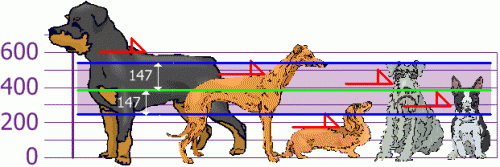24th January 2010
 MathIsFun offers nicely illustrated pages on math, algebra, geometry and maybe more.
MathIsFun offers nicely illustrated pages on math, algebra, geometry and maybe more.
For example, there is a step-by-step instruction on calculating variance and standard deviation for a set of measured dog heights, with a final picture (below) illustrating one-sigma distance from the mean. Unfortunately, concepts of normal distribution and %% of data points within each sigma range are not discussed, but that might as well be too much for a nice explanation. There are also animations, like this mean machine. Overall, MathIsFun is a nice resource for younglings.

Posted in Links | No Comments »
3rd January 2010
Just a quick note: upgrading Drupal using a patch file is a really efficient and fast method, especially because diff/patch files are available for different Drupal version combinations.
Posted in Drupal, Links, Notepad, Web | No Comments »
13th November 2009
A nice report on the cost of bruteforcing variable-length and variable-complexity passwords using cloud computing services (e.g. Amazon’s EC). There’s a kind of a tutorial in their previous post.
Slow DoS attack with just 1 computer against a number of web servers, including Apache: slowloris. There is a solution for Apache, packaged for RedHat and also available for Debian.
Finally, there’s Go programming language. The most inspiring promise to me personally is the ease of execution parallelization with language’s built-in syntactic constructs. That is something highly desired. Also, I like that it is a compiled language. However, it might be 10%-20% slower than pure C. Let’s see how it grows.
Posted in Links, Misc, Programming, Security, Web | No Comments »
5th November 2009
ocrodjvu = OCRopus (tesseract) + DJVU
It is a small command-line tool to easily convert your image-only DJVU files into image+text DJVU files. In Debian testing, there are language packages for (in no specific order) German, English, French, Spanish, Vietnamese, Brasilian Portuguese, Dutch, and Italian. The original tesseract-ocr software includes training data & code, so it should be (at least in theory) easy to add more recognition languages.
Posted in Links, Software, Technologies | No Comments »
25th October 2009
Production: see http://www.howtoforge.com/how-to-set-up-apache2-with-mod_fcgid-and-php5-on-debian-etch – it is for Debian Etch (which is old-stable), but many of the steps apply equally well to Debian Lenny (current-stable). Also, this is a very basic guide, as if you are going to host multiple sites from multiple clients, you most definitely will need some hosting control panel.
Development: see http://www.ruzee.com/blog/2009/01/apache-virtual-hosts-a-clean-setup-for-php-developers. This setup works very well, unless you need to create several virtual hosts every day – in which case necessary actions could be partially scripted.
Posted in Links, Notepad, PHP, Programming, Software | No Comments »
16th October 2009
PwdHash uses your “single password” to create a site-unique password (by making a one-way hash of your password and the site’s domain).
Although I’m not using “single password for all sites”, PwdHash does look very convenient.
Posted in Links, Software, Web | No Comments »
7th October 2009
 Today Google celebrates the invention of the barcode.
Today Google celebrates the invention of the barcode.
To help in this celebration, you can make a barcode with your site’s address (there is at least one more at barcodesinc, but at the moment of writing it is painfully slow).
I find these parameters nearly optimal:
- Type: Code 128-B
- Styles: Draw value text
- Size: 234×60 (half-banner size)
- Xres: 1
- Text font: 5
- Value: bogdan.org.ua

If you wish, you can also exactly replicate today’s Google logo – which says “Google”, as you could have guessed.
You can place this barcode on your “souvenirs” – pens, cups, t-shirts. Many phones now have barcode scanners (e.g. Nokia E71), so put this code onto your namecard.
Read on to learn about matrix barcodes.
Read the rest of this entry »
Posted in Links, Misc, Software, Web | 1 Comment »
 MathIsFun offers nicely illustrated pages on math, algebra, geometry and maybe more.
MathIsFun offers nicely illustrated pages on math, algebra, geometry and maybe more.

